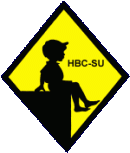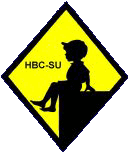
Figure 1.-- |

|
After World War II, large numbers of Germans fleed or were driven from neigboring countries. Many of these Germans came from families that had little or no contact with Germnany for centuries and were thus in many ways like foreign immigrants. We have not yet found any accounts of their exoeriences in German schools. Some Germans to evade procecution for war crimes or because of the desperate economic conditions emmigrated from Germany. A reader has provided us some details about his boyhood in Bolivia. Also after the War, foreign countries built military bases in Germany and eventually foreign families came to Germany. Other foreigners lived in Germany as a result of diplomatic, corporate, academic, or religious postings. One reader whose father taught in France attended French schools, but as an American boy remembers a trip to Germany. Some HBC readers have provided some details of their experiences. A British reader who father was in the military rembers his experiences as a British boy in Germany. As the German economy expanded, foreigners were recruited to serve as guest workers and they eventually brought families. Many of these guest workers were Turkish. West Germany participated in exchange programs sending German students abroad and hosting foreign students in Germany. A HBC reader has provided an account of his experiebces as an American exchange student in northern Germany during 1955. We note American exchange students in Germany during the 1960s. German students also went to other countries. We note a German exchange student in the United States (Texas). There were also cultural and athletic exchanges between Germans and foreigners. A British reader has provided us a detailed account as his experiences during a summer British swimming club exchange.
After World War II, large numbers of Germans fleed or were driven from neigboring countries. The refugee families were very diverse. They included people with both urban and rural backgrounds. There were German villages in Eastern countries, e.g., the „Balkanschwaben“ in Rumania, and in bigger cities, e.g., in the Baltic countries, there were larger German populations. Rremember like the still German speaking communities in the United States or specially in New York with their Steuben parade), mostly of middle or upper class. And some parts of former Germany were given to Poland and Czechoslovakia with a more or less complete German population before the war. All these were German families. Some of these Germans came from families that had little or no contact with Germnany for centuries and were thus in many ways like foreign immigrants. This was especially true in the 1980s and 90s when immigrants, the „Wolgadeutsche“, from the former Soviet Union began to arrive. These people had largely lost contact with Germany, often since the 18th-19th centuries. We have not yet found any accounts of their experiences in German schools. In some areas they must have has a substantial impact. A German reader writes, "I remember that my class in 1951, we were 16-17 years olds, and 12 pupils of the 30 pupils were boys from German refugee families. Compared to today, I think, we were children and pupils without such irritations like smoking, mobile phone, money earning by outside tasks to buy a mountain bike (not yet invented at that time) or motor bike. Of course, not all liked each other, not all liked soccer, not all liked to go to the theater or opera, not all had much interest in girls. Big travelling was not possible in the late 40s and early 50s. It was a shock when one of the classmates died in a traffic accident (1949). - It was the time after the end of the war, all families had problems to find their way again, fathers left in the war or as POW, new housing, new jobs. The children were aware that they had a good chance by learning in school for their future. We had teachers which we liked and teachers which we didn't like (most teachers in our gymnasium were male; I can remember only one female teacher in French for 2 years or so)."
Another German reader tells us, "Refugees from the last war are now integrated that the children can and do attend our regular state schools."
Some Germans to evade procecution for war crimes or because of the desperate economic conditions emmigrated from Germany. A reader has provided us some details about his boyhood in Bolivia.
Also after the War, foreign countries built military bases in Germany and eventually foreign families came to Germany. Other foreigners lived in Germany as a result of diplomatic, corporate, academic, or religious postings.
Other foreigners lived in Germany as a result of diplomatic, corporate, academic, or religious postings. This is similar to most countries. A German reader writes, "In big cities, Berlin, Bonn (for historical reasons), Frankfurt, Hamburg, Munich there are (private) schools of foreign organisations (embassies, consulates, industry etc) for children of their nationality, some are also open for Germans, on a full regular basis leading to a foreign and German school termination (Abitur) or only offered on saturdays for children of the resp. nationality (I know of a Chinese family studying for an engineering doctorate in Germany where the child from 4 years up was brought to a saturday Chinese school in Frankfurt by the parents; the girl, now 10 years old, is fluent in Chinese and German, best in the class !). Fees at these schools are expensive." There are also international ( internats ) boarding schools like the famous Insel Mainau in the Bodensee (Lake Constance).
Also after the War, foreign countries built military bases in Germany and eventually foreign families came to Germany. This was first as occupiers and later as allies through the North Atlantic Treaty Organization (NATO) in the Cold War. While all countries have foreign communities, these military families was rather unusual. Quite a number of foreigners involved,primarily because of the World War II occupation and then after the War, Germany became the front line of the Cold War, the only place where Armerican and Soviet military forces directly confronted each other. One reader whose father taught in France attended French schools, but as an American boy remembers a trip to Germany. Some HBC readers have provided some details of their experiences. A British reader who father was in the military rembers his experiences as a British boy in Germany. Despite the size of the foreign military community, contacts between Germans and foireigners were limited. A German reader writes, "The military families of the United States, Canada, the United States, The Netherlands, and France had schools for their children in the army centers run by their respective military organisation. In the town were I am living we have a rather big U.S. garrison. The only thing we see from these children is the school bus collecting them from their family homes spread over the town. Officers are allowed to live in normal housing areas, the school bus stops there and picks the children up. There is not much relation between schools of the army and German schools. Certainly, around the home children come in contact with playmates around. It is a general situation that there is not much general contact between army personal and Germans around (may be an exception in discos and some clubs – diners etc –)."
As the German economy expanded, foreigners were recruited to serve as guest workers and they eventually brought families. Many of these guest workers were Turkish. A German reader writes, "Children from the socalled „Gastarbeiter“ families from Italy, Greece, Turkey, Spain, Portugal etc attend the normal German schools (with some problems, there are classes where German pupils are in the minority) as the parents (workers etc) normally are not able to pay for the private schools."
West Germany participated in exchange programs sending German students abroad and hosting foreign students in Germany. A HBC reader has provided an account of his experiebces as an American exchange student in northern Germany during 1955. We note American exchange students in Germany during the 1960s. German students also went to other countries. We note a German exchange student in the United States (Texas). There were also cultural and athletic exchanges between Germans and foreigners. A British reader has provided us a detailed account as his experiences during a summer British swimming club exchange.
A British reader tells us about his experiences in a German-language Swiss borsing school. In particular he remembers his friend, Mathias, a German boy.
Germany's prestigious universities have attracted students from all over the world. A German reader writes, "At universitites and colleges we have about 10-20 % foreign students depending on the field of studies." This is limited somewhat by the need to learn German which outside Europe is not widely spoke or taught. I'm not sure where the foreign students in German universities come from, but suspect it is primarily neighboiring European countries. A German reader tells us that this is not the case, "When I studied Electrical Enginnering 1954 – 1959 we had in the group of about 90 students one coming from Luxemburg and one coming from Libanon. (as a side remark there was one female student with us). In the 70s and 80s most of the foreign students (in engineering disciplines) came from Asia, Egypt, Iran, Vietnam, Thailand, India, Indonesia, ... Now, there is also a big group from Africa, Tunesia, Maroq, and the states to the south there, Nigeria etc. Since the falling down of the European wall there are also students from Easten Europe, Rumania, Baltic countries etc."
Related Chronolgy Pages in the Boys' Historical Web Site
[Main Chronology Page]
[The 1880s]
[The 1930s]
[The 1940s]
[The 1950s]
[The 1960s]
[The 1970s]
[The 1980s]
Related Style Pages in the Boys' Historical Web Site
[Main German foreign school experiences page]
[Main country page]
[Long pants suits]
[Short pants suits]
[Socks]
[Eton suits]
[Jacket and trousers]
[Blazer
[School sandals]
Navigate the Boys' Historical Clothing Web Page
[Introduction]
[Activities]
[Biographies]
[Chronology]
[Clothing styles]
[Countries]
[Bibliographies]
[Contributions]
[FAQs]
[Glossaries]
[Images]
[Links]
[Registration]
[Tools]
[Boys' Clothing Home]
